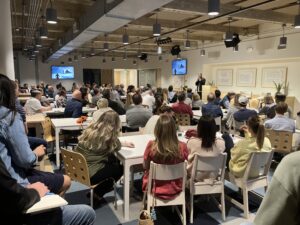Affirming People Through Mental Health Conversations
AMIA Communications
 How can the Church encourage conversations about mental health? It’s a question that All Saints Dallas has been asking for several years, says Guy+ Delcambre, Associate Pastor of Arts and Pastoral Care.
How can the Church encourage conversations about mental health? It’s a question that All Saints Dallas has been asking for several years, says Guy+ Delcambre, Associate Pastor of Arts and Pastoral Care.
This question has had numerous answers, including inviting church members to share testimonies of how God has worked amid mental health struggles. “We want to give people the space to talk about their own stories and journey. They’re broader than just mental health, but I think people are encouraged by other people walking through difficulty, walking through suffering, experiencing the presence of Christ where they need it in their lives.”
The church has also answered through offering a small group class focused on raising awareness and initiating mental health conversations. “I had a little bit of an uptick in people that I was referring out for therapy, and the more conversations I was having with people, it just seemed like people wanted more than just a Bible study,” Guy+ shares. “What I wanted to do was identify a program that would normalize the conversation of mental health across the board.”
The Sanctuary Course provided an introductory survey that fit the bill, offering a study guide designed to raise awareness and start conversations in local churches regarding mental health. All Saints was also drawn by the way the course incorporates insights not only from clinicians and theologians but also from the works of practicing visual artists and poets such as Malcolm Guite.
Similar to the Alpha course, The Sanctuary Course uses 20-minute videos along with a coursebook with prompts for conversation that help participants unpack the topic at hand through 45-minute table talks. Guy+ recruited a mental health practitioner to serve as facilitator to provide a professional perspective as well as to elevate church members serving vocationally in mental health care roles.
The response was overwhelmingly positive. “I think the aha moment was [participants] exploring their interior landscape a little bit,” Guy+ says. Participants discussed questions such as “What is mental health?” “What does anxiety look like?” and “What does it look like to care for people?” These discussions prompted three participants to begin their own counseling journeys for the first time, and All Saints supported them in getting started.
Each person who began the course stayed until the end, Guy+ shares. “People were asking, ‘Are we doing it again?’ and ‘Where can we go from here?’” The church is considering not only when they can offer the course a second time but also how it could do a deeper dive into more specific mental health topics such as dealing with anxiety and serving as a caregiver for a family member.
As All Saints has explored ways to foster conversation and understanding about mental health, it has become increasingly aware that the church doesn’t need to have it all figured out but can partner with skilled professionals as it walks alongside people who are struggling. In light of this, the church has shifted its philosophy of pastoral care, both defining what pastoral care is and looking to journey with those who are seeking care for a time rather than immediately referring them out.
“We look at it as bringing that counselor into the pastoral care process rather than just outsourcing it and sending a parishioner out and losing track of what’s going on with them,” Guy+ explains. “We’ve begun to establish a little bit more of a pastoral care plan for them and with them. … We pray with them, we help them establish a sense of order through spiritual practices and spiritual discipline, and then we bring a licensed professional counselor in obviously, and they do their own treatment planning. … It’s something that’s important to us so that we know that we’re walking with our parishioners. We’re not just giving them the help they need and moving on from them.”
Guy+ is also working with a group of about 30 mental health professionals at the church to define and professionalize the pastoral care process at All Saints. This includes identifying vetted counselors and creating a plan to come alongside parishioners who can’t afford care.
In addition to helping those who are struggling, these shifts help to address a common misconception: that those dealing with mental health issues must have faced something deeply scarring in their past or family of origin. But Guy+ explains, more often than not, mental health struggles are a common part of the human experience.
Sometimes, Guy+ says, we tend to take an approach of “Well, have you prayed about that?” and make assumptions that a person dealing with mental health challenges is deeply troubled or lacking in faith. But, “More often than not, it tends to not be the case. It tends to just be working through current anxieties, and maybe there is a root within their childhood experience as well. But it’s not that they’re so deeply broken, intrinsically broken from their childhood. It can be the simple pace of life, the speed at which society moves sometimes, the amount of things that we all juggle. Our threshold of stress has just increased.”
Addressing mental health challenges as part of the human experience can begin as simply as inviting a church member to share how God has worked amid his or her struggles, Guy+ says. “And I’ve encouraged several friends at different parishes, different churches that I’ve seen no better program recently than The Sanctuary Course. … You can literally invite people to your house, watch the 20-minute video and just have a conversation about it. And it immediately begins to normalize that conversation and show parishioners that their church is affirming the conversation of mental health and leaning into it, even though they don’t have the answers necessarily worked out just yet.”
Even small steps to invite conversation about mental health can have a big impact. “I think it’s a deep encouragement,” Guy+ shares. “It shows that their church is standing in solidarity with them, and that in and of itself can be deeply affirming for people.”











